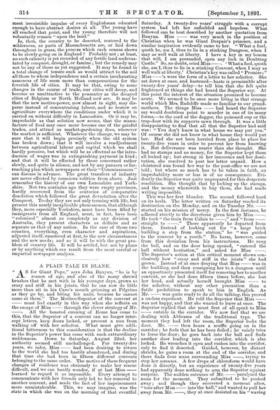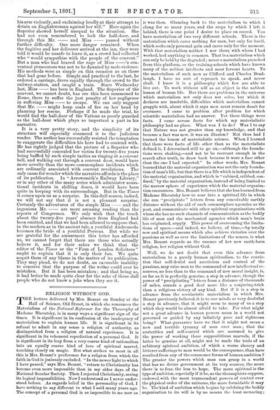A PLAIN TALE IN BLANK. "A S for Giant Pope," says
John Bunyan, "he is by reason of age, and also of the many shrewd brushes that he met with in his younger days, grown so crazy and stiff in his joints, that he can now do little more than sit in his Cave's mouth grinning at Pilgrims as they go by, and biting his nails, because he cannot come at them." The Mother-Superior of the convent at — must feel exactly in this way .when she reflects on the escape of Miss — through the clever strategy of Mr.
All the boasted cunning of Rome has come to this, that the Superior of a convent can no longer inter- cept letters, keep doors locked, or prevent a nun from walking off with her solicitor. -What must give addi- tional bitterness to this consideration is that the decline in the Superior's power has come with such extraordinary suddenness. Down to Saturday, August 22nd, her authority seemed still unchallenged. For twenty-five years, we infer, Miss — had been desiring to return to the world she had too hastily abandoned, and during that time she had been in fifteen different convents belonging to the same order. The motive of these frequent changes of residence was obviously to make her rescue difficult, and we can hardly wonder, if at last Miss learned to regard it as impossible. Every attempt to communicate with her friends only led to her removal to another convent, and made the fact of her imprisonment more unmistakeable. This, we may imagine, was the state in which she was on the morning of that eventful Saturday. A twenty-five years' struggle with a corrupt system had left her enfeebled and hopeless. What followed can be best described by another quotation from Bunyan. Miss — was very much in the position of Christian when he was Giant Despair's prisoner, and a similar inspiration evidently came to her. " What a fool, quoth he, am I, thus to lie in a stinking Dungeon, when I may as well walk at liberty. I have a key in my bosom that will, I am persuaded, open any lock in Doubting Castle." So, no doubt, cried Miss . What a fool, quoth she, am I, thus to lie in a stinking Convent, when I may as well walk at liberty,' Christian's key was called " Promise;" Miss —'s wore the form of a letter to her solicitor. She sat down at once, and hastened—haste is permissible after twenty-five years' delay—to tell him that she felt quite frightened at things she had heard the Superior say. At this point the interest of the situation promised to become acute. We seemed to be once more living in that strange world which Mrs. Radcliffe made so familiar to our grand- mothers. The things Miss — had heard the Superior say would doubtless point to murder in one of its many forms,—to the cord or the dagger, the poisoned cup or the trap-door with its supports sawn through. It was a little disappointing to find that all that the Superior had said was : " You don't know in what house we may put you." Of course she did not know in what house they would put her. Had she not been hurried from place to place for twenty-five years in order to prevent her from knowing it. But deliverance was nearer than she thought. She had no stamps and no money, for the Superior kept them all locked up ; but strong in her innocence and her desti- tution, she resolved to post her letter unpaid. How a cloistered nun found her way to the post-office we are not told ; but where so much has to be taken in faith, as improbability more or less is of no consequence. Evi- dently the Superior was quite unprepared for this desperate resolution. She thought that by locking up the stamps, and the money wherewith to buy them, she had made writing impossible.
This was her first blunder. The second followed hard on its heels. The letter written on Saturday reached its destination on the Monday, and on the Tuesday Mr. started on his mission of mercy. In the first instance, he adhered strictly to the directions given him by Miss He took " the train from Calais to ," and " from straight to ." There apparently he departed from them. Instead of looking out for " a large brick building a step from the station," he " was guided to the convent by a youth." No harm, however, came from this deviation from his instructions. He rang the bell, and on the door being opened, " entered the hall without hesitation," and asked for Miss —. The Superior's action at this critical moment shows con- clusively how " crazy and stiff in the joints" she had grown. Instead of at once denying that Miss — was in the building, and then consigning her to a dungeon until an opportunity presented itself for removing her to another convent, as she had done fifteen times before, she lost her head, and actually herself brought Miss — to the solicitor, without any other precaution than a futile prohibition to speak to him in English. As Mr. — was quite ready to do all the talking, this proved a useless expedient. He told the Superior that Miss was not happy, and that she wanted to leave at once. The Superior replied that she must first of all speak to Miss outside in the corridor. We now feel that we are dealing with Abbesses of the traditional type. The moment they had left the room, the Superior locks the door. Mr. then hears a scuffle going on in the corridor ; he feels that he has been foiled ; he vainly tries to force the door; he goes back into the hall and finds another door leading into the corridor, which is also locked. He wrenches it open and rushes into the corridor, only to find it deserted. Guided, however, by distant shrieks, he gains a room at the end of the corridor, and there finds four nuns surrounding Miss —, trying to stop her screams. A few drops of chloroform would have done it directly, but an experience of twenty-five years had apparently done nothing to arm the Superior against surprise. The sudden entrance of Mr. — paralysed the nuns for the moment. They submitted to be pushed away ; and though they recovered a moment after, " tore after Miss — into the hall," and wanted to pull her away from Mr. —, they at. once desisted on his " waving his arm violently, and exclaiming loudly at their attempt to detain an Englishwoman against her will." Here again the Superior showed herself unequal to the situation. She had not even remembered to lock the hall-door, and through this Mr. — and Miss — passed without further difficulty. One more danger remained. When the fugitive and her deliverer arrived at the inn, they were told it would be unsafe to leave it, as a crowd had collected who " would sympathise with the people of the convent." But a man who had braved the rage of Miss —'s con- ventual persecutors was not to be daunted by mob-violence. His methods were as simple on this occasion as on those that had gone before. Simple and practical to the last, he ordered a carriage, drove rapidly through the crowd to the railway-station, and caught a train. Since Wednesday last, Miss has been in England. The Superior of the convent, we cannot doubt, has ere this been summoned to Rome, there to suffer the just penalty of her negligence in suffering Miss — to escape. We can only suggest that Mr. — might heap coals of fire on her head by planning her rescue. Perhaps if he made the trial, he would find the hall-door of the Vatican as poorly guarded as the hall-door which plays so important a part in his narrative.
It is a very pretty story, and the simplicity of its structure will especially commend it to the judicious reader. The author has successfully resisted the temptation to exaggerate the difficulties his hero had to contend with. He has rightly judged that the picture of a Superior who had successfully concealed her victim for twenty-five years being baffled by such simple tactics as ringing at a convent bell, and walking out through a, convent door, would have more novelty than the more commonplace incidents which are ordinarily associated with convent revelations. The only cause for wonder which the narrative affords is the place of its publication. In " Arrowsmith's Railway Library," or in any other of the many series which administer sensa- tional incidents in shilling doses, it would have been quite in keeping with its surroundings. But in the Times it comes upon us as a surprise. In this dull season, indeed, we will not say that it is not a pleasant surprise. Certainly the adventures of the simple Miss and the ingenious Mr. -- are more amusing reading than the reports of Congresses. We only wish that the touch about the twenty-five years' absence from England had been omitted, and that we had been allowed to suppose that, in the modern as in the ancient tale, a youthful Andromeda becomes the bride of a youthful Perseus. But while we are grateful for the amusement this letter has afforded us, we cannot forget that there are those who actually believe it, and for their sakes we think that the editor of the Times or the " Firm of London Solicitors " ought to explain that it is only their fun. We quite acquit them of any blame in the matter of its publication. They may plead, we do not doubt, an excusable inability to conceive that the purpose of the writer could ever be mistaken. But it has been mistaken ; and that being so, it had better be made quite clear for the sake of those dull people who do not know a joke when they see it.



































 Previous page
Previous page